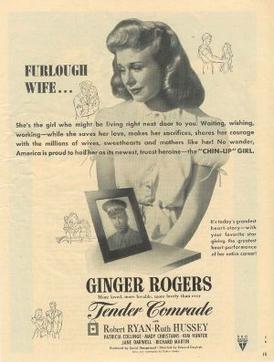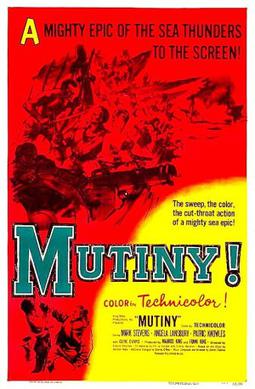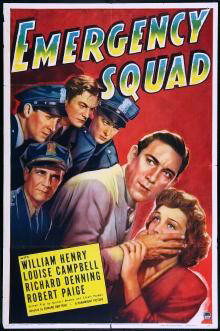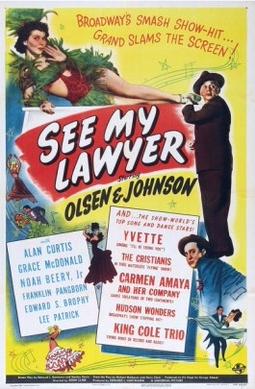Related Research Articles

Edward Dmytryk was a Canadian-born American film director and editor. He was known for his 1940s noir films and received an Oscar nomination for Best Director for Crossfire (1947). In 1947, he was named as one of the Hollywood Ten, a group of blacklisted film industry professionals who refused to testify to the House Un-American Activities Committee (HUAC) in their investigations during the McCarthy-era Red Scare. They all served time in prison for contempt of Congress. In 1951, however, Dmytryk testified to the HUAC and named individuals, including Arnold Manoff, whose careers were then destroyed for many years, to rehabilitate his own career. First hired again by independent producer Stanley Kramer in 1952, Dmytryk is likely best known for directing The Caine Mutiny (1954), a critical and commercial success. The second-highest-grossing film of the year, it was nominated for Best Picture and several other awards at the 1955 Oscars. Dmytryk was nominated for a Directors Guild Award for Outstanding Directorial Achievement in Motion Pictures.

James Oliver Curwood was an American action-adventure writer and conservationist. His books were often based on adventures set in the Hudson Bay area, the Yukon or Alaska and ranked among the top-ten best sellers in the United States in the early and mid 1920s, according to Publishers Weekly. At least one hundred and eighty motion pictures have been based on or directly inspired by his novels and short stories; one was produced in three versions from 1919 to 1953. At the time of his death, Curwood was the highest paid author in the world.

John Richard Moore Jr. was an American actor known professionally as Dickie Moore, he was one of the last surviving actors to have appeared in silent film. A busy and popular actor during his childhood and youth, he appeared in over 100 films until the early 1950s. Among his most notable appearances were the Our Gang series and films such as Oliver Twist, Blonde Venus, Sergeant York, Out of the Past, and Eight Iron Men.

Richard Bryce, known professionally as Dickie Valentine, was a British pop singer who enjoyed great popularity in Britain during the 1950s. In addition to several other Top Ten hit singles, Valentine had two chart-toppers on the UK Singles Chart with "Finger of Suspicion", featuring The Stargazers (1954) and the seasonal "Christmas Alphabet" (1955).

The Sniper is a 1952 American film noir, directed by Edward Dmytryk, written by Harry Brown and based on a story by Edna and Edward Anhalt. The film features Adolphe Menjou, Arthur Franz, Gerald Mohr and Marie Windsor.

Tender Comrade is a 1943 black-and-white film released by RKO Radio Pictures, showing women on the home front living communally while their husbands are away at war.
John Paxton was an American screenwriter.

Richard Percy Jones, known as Dick Jones or Dickie Jones, was an American actor and singer who achieved success as a child performer and as a young adult, especially in B-Westerns. In 1938, he played Artimer "Artie" Peters, nephew of Buck Peters, in the Hopalong Cassidy film The Frontiersman. He is also known as the voice of Pinocchio in Walt Disney's film of the same name.

Top Banana is a musical with music and lyrics by Johnny Mercer and book by Hy Kraft which premiered on Broadway in 1951. The show was written as a star vehicle for comedian Phil Silvers, who played the host of a television variety show program. Silvers won the Tony Award for Best Performance by a Leading Actor in a Musical in 1952.

Behind the Mask is a 1932 American pre-Code crime/horror film directed by John Francis Dillon and starring Jack Holt, Boris Karloff and Edward Van Sloan.

Obsession, released in the United States as The Hidden Room, is a 1949 British crime film directed by Edward Dmytryk. It is based on the 1947 novel A Man About a Dog by Alec Coppel, who also wrote the screenplay for the film. Obsession was entered into the 1949 Cannes Film Festival.

Mutiny is a 1952 American Technicolor adventure film directed by Edward Dmytryk and starring Mark Stevens, Angela Lansbury and Patric Knowles. The picture was produced by the King Brothers Productions and based on a story by Hollister Noble; the two parties had previously collaborated on Drums in the Deep South.

Devil Dogs of the Air is a 1935 Warner Bros. film, directed by Lloyd Bacon and starring James Cagney and Pat O'Brien, playing similar roles as close friends after making their debut as a "buddy team" in Here Comes the Navy. Devil Dogs of the Air was the second of nine features that James Cagney and Pat O'Brien made together. The film's storyline was adapted from a novel by John Monk Saunders.

Television Spy is a 1939 American drama film directed by Edward Dmytryk and starring William Henry.

Emergency Squad is a 1940 American adventure film directed by Edward Dmytryk.

Sweetheart of the Campus is a 1941 American musical comedy film directed by Edward Dmytryk and starring Ruby Keeler, Ozzie Nelson and Harriet Hilliard. It was produced and distributed by Columbia Pictures. The film's working title was Betty Co-ed and it was also released as Broadway Ahead.

Eight Iron Men is a 1952 American World War II drama film directed by Edward Dmytryk and produced by Stanley Kramer. It stars Bonar Colleano, Arthur Franz, Lee Marvin, Richard Kiley and Mary Castle. Lee Marvin's powerful performance as the squad's leader ratchets up the suspense along with Dmytryk's noir style direction and J. Roy Hunt's deft cinematography.

The Gun Hawk is a 1963 American Western film directed by Edward Ludwig and starring Rory Calhoun, Rod Cameron, Ruta Lee and Rod Lauren.

Sing a Jingle is a 1944 American musical film directed by Edward C. Lilley and starring Allan Jones, June Vincent and Samuel S. Hinds.

See My Lawyer is a 1945 American comedy film directed by Edward F. Cline and written by Edmund Hartmann and Stanley Davis. It is based on the 1939 musical See My Lawyer by Richard Maibaum and Harry Clork. The film stars Ole Olsen, Chic Johnson, Alan Curtis, Grace McDonald, Noah Beery Jr., Franklin Pangborn and Edward Brophy. The film was released on March 9, 1945, by Universal Pictures.
References
- ↑ Vallance, Tom (July 3, 1999). "Obituary: Edward Dmytryk" . The Independent. London. Archived from the original on June 18, 2022. Retrieved May 1, 2011.